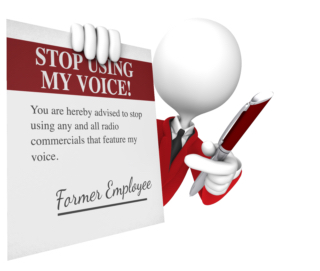 A Loyal Reader Writes:
A Loyal Reader Writes:
“Another former radio person and myself are having a discussion about a radio station’s use of our voice after we leave that company. We are both still on commercials that run regularly. She has been gone a year, myself two years. There are no provisions in the employee handbook we were issued about the subject.
“From your experiences do we have any rights to say ‘cease and desist’? Can we invoice them for the voice work or are they totally within their rights to profit of our voices after we leave their employ?”
Dan Replies:
Let’s get the disclaimer out of the way.
I’m not a lawyer.
I’m not offering legal advice.
I don’t known nuthin’ ’bout legal stuff.
You got a legal question, ask an attorney.
Okay?
My experience and limited understanding of the law leads me to believe that if you don’t have a contract saying that when you leave their employ, the radio station must stop airing anything that contains your voice…
…you’re out of luck.
Certainly if when you were hired it was understood that your job included voicing commercials and you didn’t have such a “when I leave, you have to stop using my voice” clause, I believe the spots you recorded would be considered a “work for hire”…
…which would mean it’s the property of the radio station.
The only silver lining in this cloud is the heads up it should give to in-demand radio personalities who sign with a new employer or who sign a new contract with their existing employer:
Add a clause to the contract that says any characters, features, contests or other unique elements that you create for your radio show will remain your intellectual property in the event that, for any reason, you leave the station’s employ.
(To see what happens when it doesn’t occur to the talent to require such a clause, see “David Letterman and Larry ‘Bud’ Mellman.'”)
Returning to your original question:
While you might have a hard time establishing ownership of spots that you voiced anonymously, in your next contract it probably would be an excellent idea to stipulate that if and when you leave the radio station’s employ, the station must immediately cease airing any spots that identify you by name.
But even that has hairs that can be split. For example, what if the client paid extra to have you identify yourself on that spot?
But to answer your directly: In my non-legal opinion which should not be construed as legal advice, I don’t think you’d be successful trying to stop your previous employer from airing commercials that you voiced as a routine part of your job.

